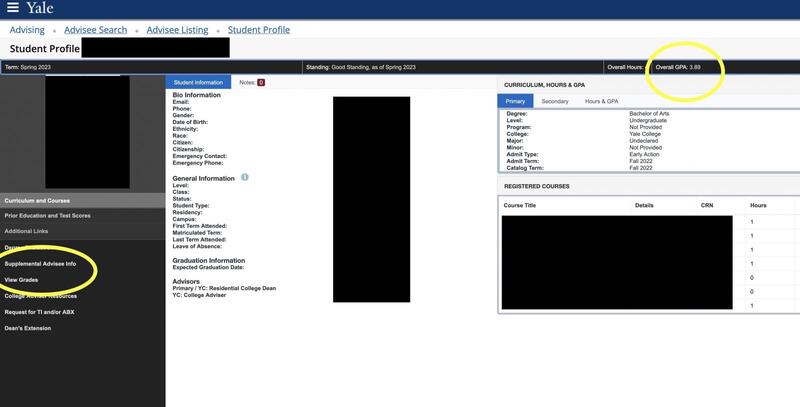- When to contact your advisees

- Where to find your advisee’s contact information
- What your email to your advisees might say
- What to talk about during your advising meetings
- When spring course schedules are due
- What if …
- What else …
Your sophomore advisees (along with all other returning Yale College students) registered for spring courses at the end of the fall term, but some things may have changed over winter break:
- their thoughts about a prospective major, summer study abroad , or interests may have changed
- they may have learned that they were not accepted into a limited-enrollment course they registered for in late fall, or a by-application-only major, and now need to adjust their course schedule during add/drop period
► For those reasons, your sophomore advisees will appreciate hearing from you in early January or at the start of the spring term to schedule a meeting during the first two weeks of the spring term.
We recommend a minimum half-hour meeting, but some meetings may be shorter or longer.
See also: Sophomore Advising Timeline, Meeting Your Sophomore Advisees, Goals of Spring-term Sophomore Advising* (spring), and Sophomore Academics.
Where to find your advisees’ contact information
Your advisees’ contact information, grades, and other advising-related information are available via Student Profile (under “DUS, and DGS Resources” on the Registrar’s Office’s website). The URL for Student Profile, for those who want to bookmark it, is https://studentsystems.yale.edu/StudentSelfService/ssb/termSelection.
Your advisees’ Student Profiles pages also include links to “Supplemental Advisee Info” (biographical information) and “View Grades” (see below for location of links). GPAs are listed on the top right.

What your email to your advisees might say
Your “welcome back” email might contain words of greeting plus the dates and times you’ve set aside for one-on-one advising meetings (or a link to your calendaring app)
What to talk about during your advising meetings
- Your meetings should be holistic in nature and touch on academics (including course selection and distributional requirements for the sophomore year) as well as extracurricular activities, but also — and perhaps more importantly —they should recap the fall term. You’re encouraged to elicit your advisees’ thoughts on lessons learned and adjustments they plan to make in the spring term, as well as their thoughts about their prospective majors.
- The vast majority of sophomores declare a major by the end of the sophomore year, while all undergrads must declare a major no later than the beginning of the junior year,.
- Sophomores who intend to major in a STEM field but haven’t yet declared a major should be encouraged to do so as soon as possible in order to receive accurate advising on course sequences and major requirements (most students interested in STEM declare the major in their first year).
- You’re not expected to know all 2,000 Yale College courses, 80+ majors, and the academic rules and regulations. Any questions about academics that you don’t know how to handle should be addressed to the dean of your residential college, to the relevant DUS, or to advising@yale.edu.
- See Conversation starters
When spring course schedules are due
- Students must finalize their course schedules by 5:00 p.m. on the last day of add/drop period. See the University Registrar’s “Registration Calendar” for dates.
- You’re unavailable to meet your advisees this semester
- inform your advisees’ residential college dean so that the dean may make alternative arrangements.
- Students are missing from your list of advisees
- the most likely explanation is that your advisee has declared a major and the DUS has become your advisee’s adviser
- Only the Registrar’s Office has full access to adviser/advisee matches, so please direct any questions about “missing” advisees to registrar@yale.edu
Spring deadlines
- the Yale College Calendar with pertinent spring deadlines, including Martin Luther King Jr. Day, when classes do not meet, is available here
